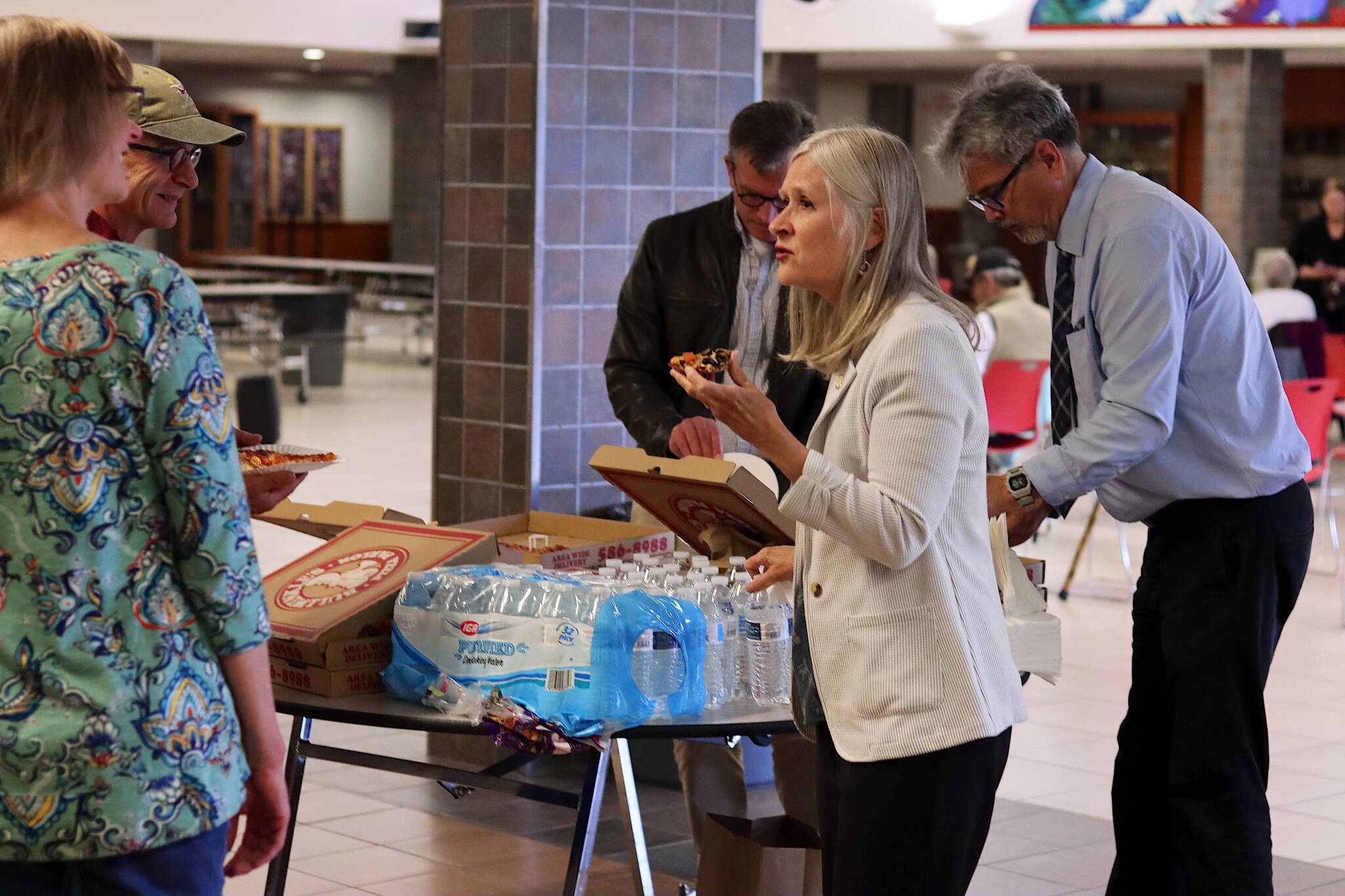Residents expressing generally favorable opinions about their local representatives and frustration about recent actions by Alaska’s government as a whole — a frequent contrasting truism of politics — was the theme during a town hall Thursday hosted by members of Juneau’s legislative delegation.
About 25 people praised the local lawmakers for their efforts on issues ranging from seeking more education funding to banning PFAS chemicals during the hour-long event at Juneau-Douglas High School: Yadaa.at Kalé. But numerous questions were raised about a veto to half of a $175 million education funding increase, ongoing shortages of health care and rehabilitation programs, housing costs, and bureaucratic state hiring practices.
State Sen. Jesse Kiehl and Rep. Andi Story, both Democrats, offered overviews of this year’s legislative session that concluded May 18 before taking questions from the audience. Rep. Sara Hannan, also a Democrat, was absent from the event due to a family matter.
The first of a few complaints and questions about Gov. Mike Dunleavy’s veto of half of a one-time $680 per-student increase in education funding was offered by Mark Brown, who took the microphone and came to the front of the audience.
“He has chopped again, the education (increase) in half,” Brown said. “How dare he? I have little babies to take care of. And I don’t like that Dunleavy at all. Not even slightly. He’s jeopardizing our children’s future.”
Kiehl, taking the microphone, told Brown “you’ll find tremendous agreement on two things.”
“One is the critical importance of education,” the senator said. “And the other is the shortsightedness of the governor’s vetoes. They’re a terrible mistake for Alaska’s future.”
A question about the Legislature calling itself into a special session to override the veto came from Chris Niemi, who said she is a grandmother of three children. Kiehl and other legislators have said a special session for veto overrides is unlikely because two-thirds of members would have to agree to one and three-fourth of the full Legislature would have to vote in favor of the override, but Niemi said making the attempt would still serve a purpose.
“Even if we fail in getting the votes at least we would know what representatives and what senators are in favor of the funding for education, and which ones are not,” she said. “And that is very important I think for the citizens of Alaska to know because 90% of the children are in the public school system.”
Story said she believes the more hopeful outlook is for a long-term increase to education funding next year and “hopefully this governor’s veto will help spur even more advocates.”
She also expressed similar optimism about boosting public employee pensions, one of the top goals this session of the bipartisan Senate majority and Democratic-led House minority, through a bill that has advanced to the Senate Finance Committee that Kiehl is a member of.
“When we start the second half of the legislative session that is going to be up front and center,” Story said.
Health care was another issue raised by multiple residents.
Richard Fagnant, board president of the Alaska chapter of the National Alliance on Mental Illness, noted a mental health awareness for youths bill favored by his organization again failed to pass this year. He also cited Alaska Mental Health Trust Authority statistics showing more than 40% of people in the state’s correctional institutions have mental health issues.
“Is there anything being done for those in those institutions to bring those rates down?” he asked.
Kiehl said some accomplishments are happening, both in the Legislature and by health industry advocates in the state.
He cited the recent opening of the Aurora Behavioral Health Center at Bartlett Regional Hospital’s campus as an example of crisis stabilization facilities now being planned statewide.
“That doesn’t require being in a locked facility for 30 days, being out the street on your own and ‘don’t be sick anymore,’” he said. “We need these options in the middle.”
An effort to deal with problems with Lemon Creek Correctional Center, including a supplemental budget request for repairs to the east wing that resulted in transferring many inmates elsewhere last year, as well as programs at the facility were made during this year’s session, Kiehl said.
“We put in the budget this year a significant piece of money for the Department of Corrections to bring in experts to have a study done to make recommendations for what we can change so that we’re doing a better job on intake and with the inmates inside so that we can keep those folks alive,” he said.
The discussion about rehabilitation spurred Robert Lewis, among the audience members at the town hall, to speak openly about an instance when he overdosed on fentanyl. “That doesn’t require being in a locked facility for 30 days, being out the street on your own and ‘don’t be sick anymore,’” he said. “We need these options in the middle.”
An effort to deal with issues at Lemon Creek Correctional Center, including a supplemental budget request for repairs to the east wing that resulted in transferring many inmates elsewhere last year, as well as programs at the facility were made during this year’s session, Kiehl said.
“We put in the budget this year a significant piece of money for the Department of Corrections to bring in experts to have a study done to make recommendations for what we can change so that we’re doing a better job on intake and with the inmates inside so that we can keep those folks alive,” he said.
• Contact Mark Sabbatini at mark.sabbatini@juneauempire.com or (907) 957-2306.

